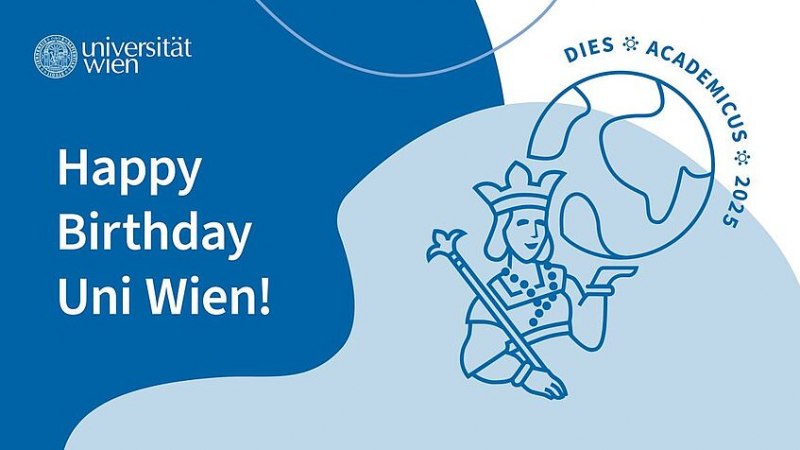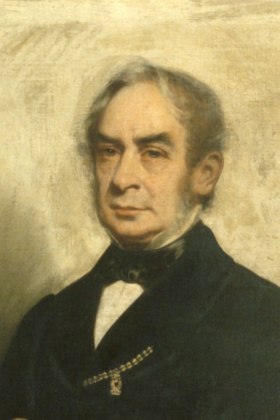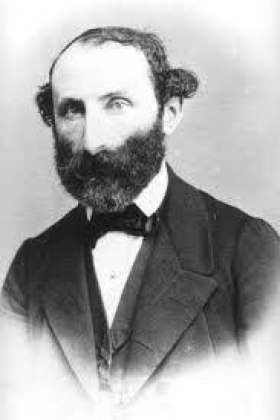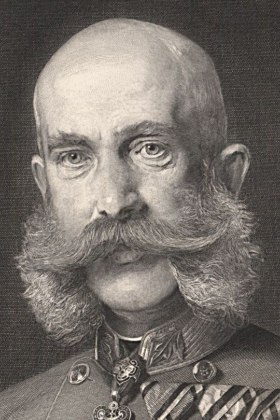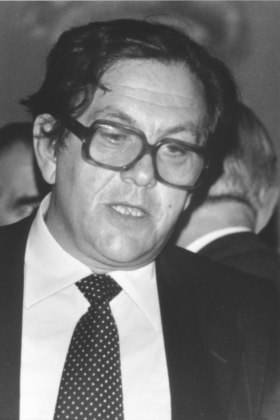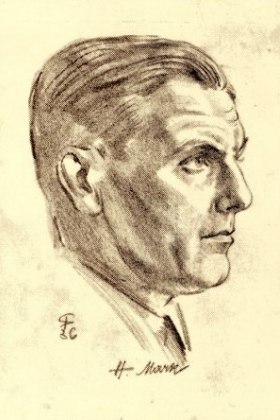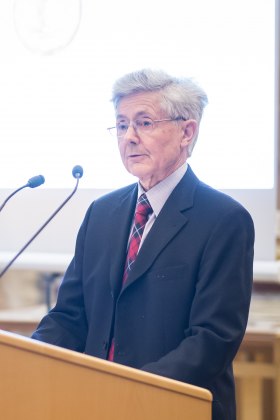University jubilees
Jubilee culture – celebrating anniversaries in regular intervals – has religious roots and was established in the German-speaking world in the modern era when it became a universally popular ritual. The University of Vienna, celebrating its 650-year-anniversary in 2015, has repeatedly taken the opportunity in the last two centuries to present its history, tradition, and historical consciousness to a broad audience.
500th university jubilee in 1865
In 1865 the first larger jubilee celebrations were held at the University of Vienna on the occasion of its 500th anniversary – at a time when the university did not yet have a representative main building. Because the university administration expected student riots, the official celebration was moved from the day of foundation on March 12 to the summer break (August 1 to 3), reducing the number of students attending the festivities. Furthermore, high ticket prices also kept students from attending. Historian Joseph Aschbach published a commemorative publication on behalf of the university, called “Geschichte der Wiener Universität im ersten Jahrhunderte ihres Bestehens” (“History of the University of Vienna in the first century of its existence”), focusing on its foundation. The university jubilee of 1865 was, however, also used as a platform for opposing objectives, for example manifesting in a “Gegenfestschrift” (“counter-celebratory publication”) by Gerson Wolf. In his “Studien zur Jubelfeier der Wiener Universität im Jahre 1865” (“Studies on the celebratory festivities of the University of Vienna in 1865”), he wrote about controversial aspects of the Viennese university history. Among other things, he questioned the date of foundation in 1365 and pointed to sources that indicated a foundation in 1237. He also addressed the relationship of Jews to the university and criticized the institution’s Catholic character.
1898 – 1915 – 1940
Not only its own jubilees, but also those of the monarchy influenced the university, as can be seen in the 50th anniversary of Franz Joseph I’s accession to the throne that was grandly celebrated in 1898. On this occasion, the senate published the homage publication “Geschichte der Wiener Universität von 1848 bis 1898” (“History of the University of Vienna from 1848 to 1898”).
The 550th and 575th anniversaries in 1915 and 1940 both fell into the second years of the First and Second World War, respectively, and were thus not really celebrated. In the interest of competition between Vienna’s universities it is remarkable, however, that the Technical University managed to celebrate its 100th anniversary in 1915 with the publication of a large book as well as several shorter texts.
600th anniversary in 1965
The jubilee of the University of Vienna in 1965 drew on intensive work by university archivist Franz Gall, who not only took care to uphold academic rituals, but also organized a university-historical anniversary exhibition as well as publishing a large part of the texts on the 600-year-anniversary of the “Alma Mater Rudolphina”. Despite his university-historical expertise, the university jubilee of 1965, however, does show an abbreviated reflection on the institution’s history, since contemporary history and controversial issues concerning the university were left out.
Instead, particularly the university’s self-representation to the public had priority: professor’s gowns were made to ensure a uniform appearance of the professorate, and the students were also – for the first time – supposed to be presented as an integral part of the university. Gall’s book “Geschichte der Wiener Universität und ihrer Studenten” (“History of the University of Vienna and its students”) almost exclusively addressed the student fraternities wearing colors and practicing academic fencing, who, as traditional bearers of the university flag, gave the celebrations in 1965 a corporative character:
“While some may be decried as ‘clerical’ and others as ‘troublemakers’, the Viennese fraternities demonstrate academic solidarity and openness to the burning questions of our time” (Gall, p.192).
The University of Vienna’s self-presentation, drawing on a broad ensemble of existing as well as new traditions and symbols of remembrance (parades, church services, postal stamps, postcards, memorial coins, etc.), was criticized both in the university and in the non-university public. This could very clearly be experienced in a counter-event organized by the Austrian Students’ Union, “Symposium 600 – Gestaltung der Wirklichkeit” (“Symposium 600 – Shaping Truth”), which forced a connection to topical subjects. The protests against the official anniversary celebrations were furthermore connected to the protests against Prof. Taras Borodajkewycz, who taught at both the University of Vienna and the University of Economics and had repeatedly made headlines with anti-Semitic statements. During a demonstration against Borodajkewycz on March 31, 1965, the former resistance fighter Ernst Kirchweger was knocked down by RFS-member Günther Kümel and died a few days later. This incident became internationally known and led Hans Kelsen to refuse the University of Vienna’s official invitation to the celebrations.
625th anniversary in 1990
This next university jubilee was held on a much smaller scale. The official celebration on May 7, 1990, attended by state dignitaries, was temporarily interrupted by student protests. They criticized central questions of a mass university of the 20th and 21st century: the financial and spatial resources given to certain institutes and the acceptance of external funds for research. Two academics displaced under National Socialism were invited as keynote speakers: Viktor Frankl and Hermann Mark. The university published two texts under the title “UniPräsent 1990”, one on its foundation and one on its contemporary achievements. Together with the Technical University, which celebrated its 175th anniversary in that same year, the University of Vienna published an anniversary stamp (double jubilee).
650th university jubilee in 2015
In 2015, the first jubilee of the University of Vienna in the 21st century offers an occasion for a number of events, exhibitions, publications, etc. (e.g. this Website History of the University of Vienna and a four volume "Festschrift: 650 Jahre Universität Wien – Aufbruch ins neue Jahrhundert“.
-
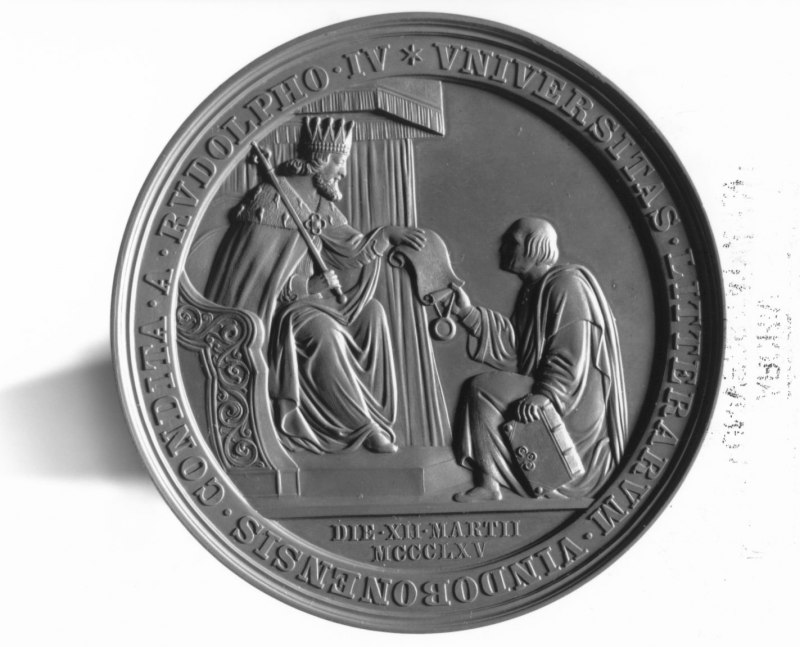
Memorial medal for the 500th anniversary of the founding of the University of Vienna, designed by C.Radnitzky F., minted 1865
Bronzemedaille mit der Inschrift: UNIVERSITAS LITT:VINDOBON: RUDOLPHO IV:XII:MARTII MCCCLXV:SECULI V FRANC:IOS. I.
-
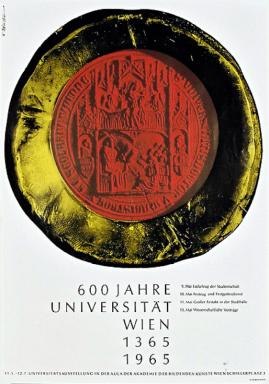
Poster „600 years of the University of Vienna 1365–1965“
-
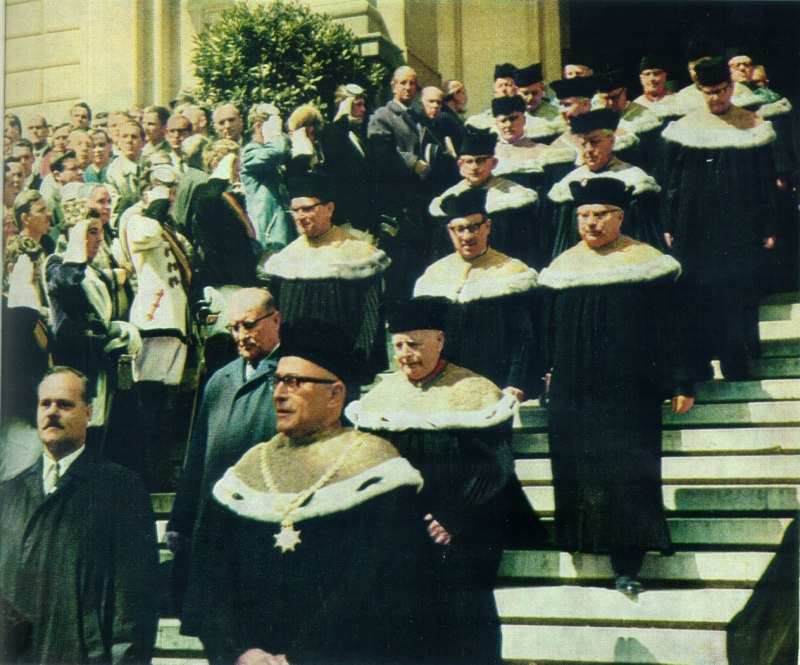
Functionaries of the University of Vienna on the main stairs at the 600 year-anniversary 1965
vorne Unterrichtsminister Piffl neben Rektor Karl Fellinger
-

Ceremony procession at the 600th anniversary of the University of Vienna, 1965
-
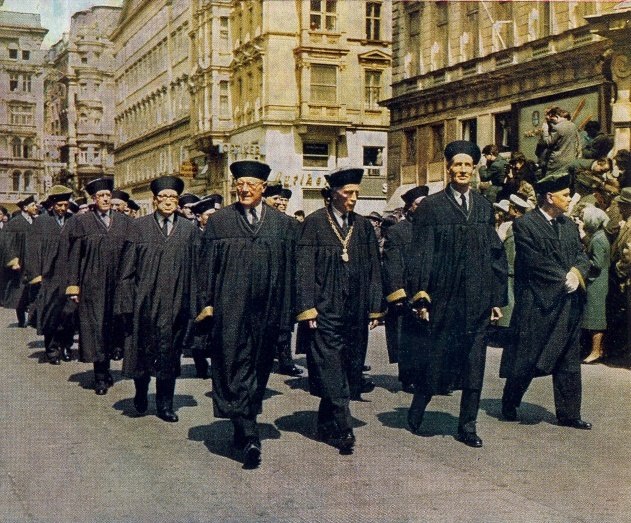
The professors of the Faculty of Medicine in the professorʼs robe at the ceremony procession on the occasion of the 600th anniversary of the University of Vienna, 1965
-
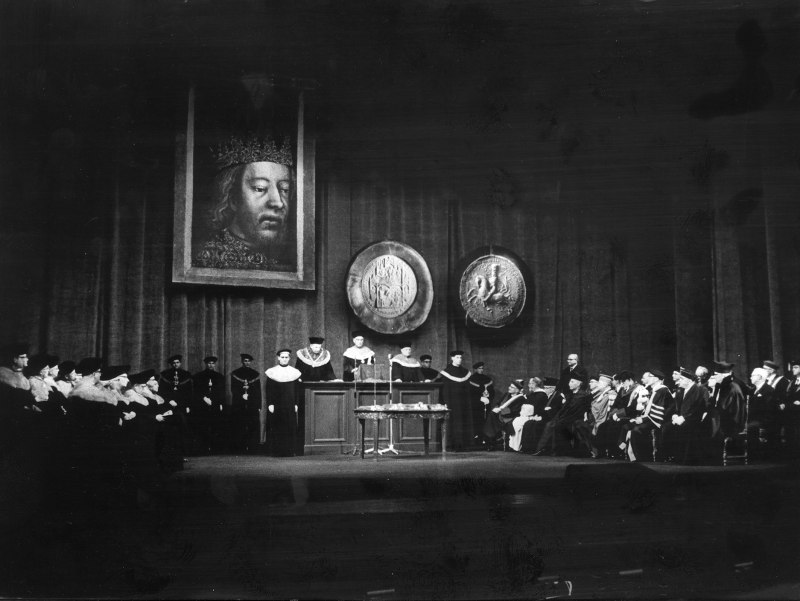
Honorary graduation during the 600th anniversary of the University of Vienna, Burgtheater Vienna, 1965
Verleihung der Ehrendoktorate an Hubert Jedin und Roland de Vaux (Katholisch-Theologische Fakultät), Ernst Wolf und Ladislaus Marton Pákozdy (...
-
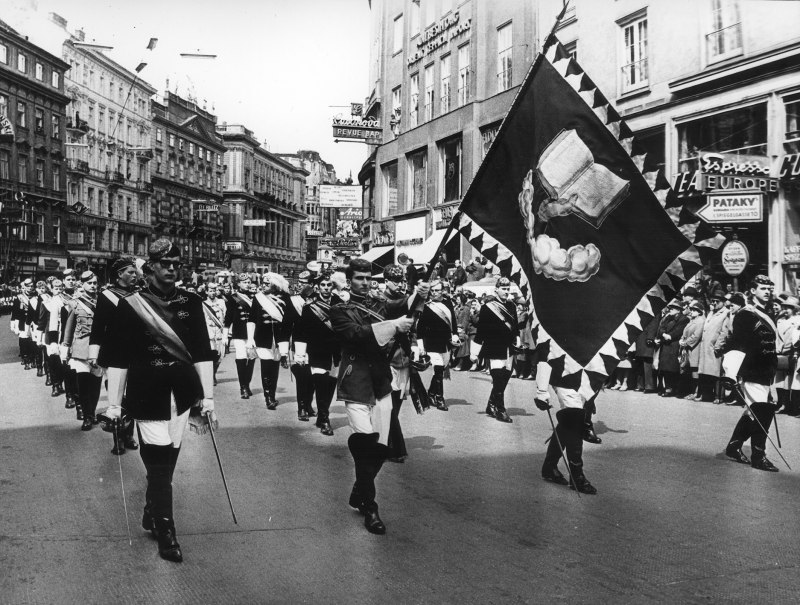
Ceremony procession of corporated student with the university flag at the 600th anniversary of the University of Vienna
-
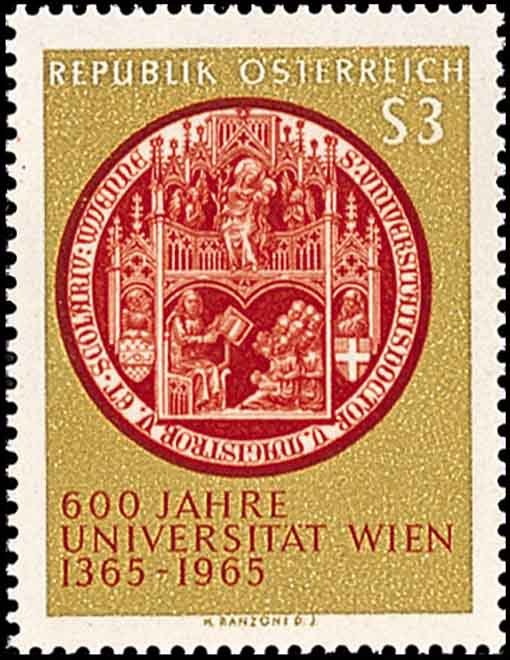
Anniversary Stamp for the 600th Anniversary of the University of Vienna, 1965
-

Anniversary Stamp for the 625-year celebration of the University of Vienna and the 175th anniversary of the Vienna University of Technology, 1990
-
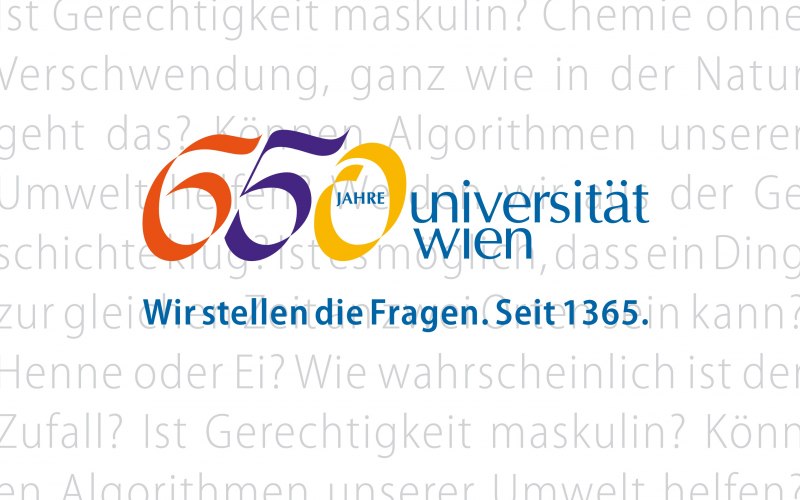
650 years of the University of Vienna, cover of the program for the jubilee of the University of Vienna 2015
Das Programmheft zu "650 Jahre Universität Wien" 2015 ist unter https://www.univie.ac.at/uploads/media/Programm-650-Jahre-Jubilaeum.pdf erreichbar.
-
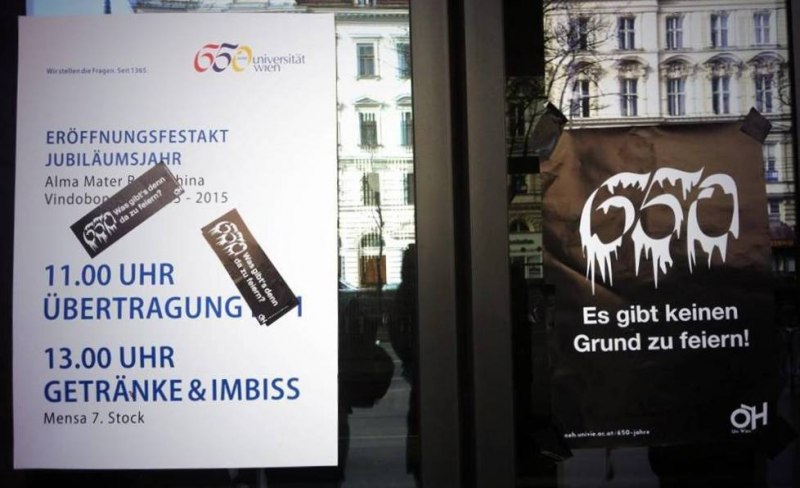
Posters for the opening ceremony of the Jubilee Year of the University of Vienna 2015 and the critical ÖH-Aktion “There is no reason to celebrate”
Last edited: 03/07/25

